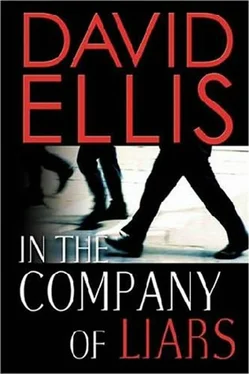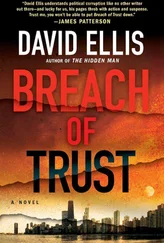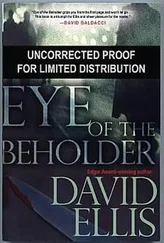McCoy takes this in. Most of this she already knew. Most of what will follow, she assumes, will be new information.
“Mateo Pagone withdrew large amounts of money from his personal account on four separate occasions in June, July, August, and September of last year,” says Teller, opening a file. “Nine thousand in June. Eighty-five hundred in July. Eight thousand in August. Forty-five hundred in September.”
Mat Pagone was no dummy. Every withdrawal was short of the ten-thousand-dollar withdrawal amount that triggers automatic reporting by the bank to the federal government.
“That’s thirty thousand dollars,” she says.
Teller opens another file. “Senator Blake spent several weeks in Sanibel Island, Florida, from mid-December last year to mid-January. A nice place on the water, a boat for his use. He paid for it by check, a check for seven thousand dollars. Blake was down there almost three weeks and there’s not a single transaction that appears on his credit card. He didn’t write any other checks, either. We know he went to the restaurants-one in particular-and we know he paid cash and, apparently, tipped well.”
McCoy can see that. Mat Pagone sent Senator Blake on a nice Florida vacation. Blake wrote a check for seven thousand for his lodging and the boat-smart move-but got something like ten thousand in cash under the table from Mateo Pagone. He blew all of it, probably, or most of it, in Florida so that he wouldn’t have to explain the sudden appearance of ten thousand dollars in his checking or savings account. He never deposited a dime of the bribe money. He just lived it up on an extended getaway.
“Mat Pagone spent a few days down there himself over Christmas,” Teller continues. “He took his daughter, Jessica.”
McCoy nods, as if she didn’t know that.
“Blake and Mat Pagone had dinner together one evening, we’re relatively sure. But that’s it. That’s the only record of them being together down there, and it’s just an eyewitness. We imagine that Pagone popped for a whole lot more than a dinner, but we can’t prove it, because everything was in cash.”
“Okay,” McCoy says. “And what about Senator Strauss?”
“Senator Strauss just bought a new SUV,” Teller continues. “He put twelve thousand down. Emptied a savings account to do it. This was three days after we have him eating lunch with Mat Pagone at the Maritime Club downtown, in October. We can find no other reason for why Strauss was in town-he lives about sixty miles from the city-other than having this lunch. That weekend, he’s buying a new car. We figure Mat Pagone helped him replenish that savings account, only that account is probably a jar in his backyard.”
“You have the lunch receipt?” McCoy asks.
“Yeah.” Teller hands her a photocopy of the bill, charged to Mat Pagone’s membership at the Maritime Club. Glazed chicken, roast beef, Cobb salad. The salad was eight dollars, so unless they really overcharged, this was an entrйe. The drinks were two bourbons and soda, one gin and tonic, and one iced tea.
Lunch for three, not two.
“Okay,” McCoy says, sliding the photocopy back to Teller. “Go on.”
“Senator Almundo is renovating the basement in his home on the West Side. On the books, the contractor is charging him ten grand. Looks to us”-Teller looks around the room at the federal agents-“like the job is more like atwenty -thousand-dollar effort, give or take. We’re thinking ten thousand was passed in cash.”
It wouldn’t be the first time a home contractor took cash. McCoy sighs. She is ready for the punch line.
Teller opens his hands. “We know Mat Pagone, or someone working with him, put money in their hands. All three of them. But the principals aren’t talking. Strauss, Almundo, Blake-they’re all taking five. Blake can point to a check that he wrote for the Sanibel home and boat, and we don’t have much to work on otherwise. Almundo will say the renovation was for ten grand, not twenty. And Strauss will just plain deny the whole thing. These guys were well coached. They didn’t put a single penny in the bank.”
Teller needs an eyewitness to the payments, he is saying, or stronger circumstantial evidence. As long as these senators kept the money in a jar behind their house, or blew it on dinners or the ponies, there is little the federal government can do. They can’t even get these guys on tax evasion, because they can’t prove that they received this income, much less failed to report it.
“Are you sure it wasn’tDillon who handed over the money?” McCoy asks.
“No, we’re not. Mat Pagone could have withdrawn the cash, and Sam Dillon could have paid it out. Or they could have had someone else do it. Someone who wouldn’t draw any suspicion whatsoever.” Teller smiles without emotion. “We were about to find that out.”
They were going to find out, Teller means, because Sam Dillon was about to testify before the grand jury, until he was murdered only days before.
“Dillon came tous,” says Teller. “He called us and told us he wanted to talk about Flanagan-Maxx. We had just convened the grand jury. He said he wanted us to subpoena him, so we did.”
Sure, that makes sense. Dillon wanted to give the appearance that he was being compelled to testify, when in fact he wanted to talk.
“So there we are,” Teller concludes. “The people at Flanagan-Maxx are playing see-no-evil, hear-no-evil. The senators won’t talk. We can’t even say for sure who put the money into their hands. Probably it was Pagone, or someone he trusted.” Teller shrugs his shoulders. “But we don’t know, Jane. We’re at a dead end.”
“So you want Mat Pagone,” McCoy gathers. “That’s the problem.”
“Our problem, Jane,” Teller replies, “is you.”
McCoy raises her hands.
“We need Mat Pagone,” he says. “We flip him and the whole house of cards comes down.”
“I need him more.” She shakes her head. “That’s a boat we can’t rock.”
Teller nods, as if he understands, but he doesn’t. He doesn’t know. Only a handful of agents, and the SAC, Irv Shiels, know what they are doing.
“What is CT looking at him for?” Teller asks her. “Can you tell me that much?”
“I can’t. Sorry.”
It can’t be the first the time the gang in CounterTerrorism refused to talk shop.
“Then let us talk to the daughter. Jessica. She was there in Sanibel.”
“Absolutely not,” McCoy says. “Off-limits.”
“Then his wife,” Teller requests. “Ex-wife. Allison.”
“No way,” she says firmly. “Can’t do it.”
Teller doesn’t respond to her comment but opens another file. “Dillon had mentioned to someone in his office that he was grappling with an ‘ethical dilemma.’ He wouldn’t elaborate, but it seems obvious enough to us. He was thinking about turning in his client. He told this guy in his office that he was talking to a lawyer.”
“Okay,” McCoy says, like she doesn’t get the point.
“Allison Pagone was not just his girlfriend,” Teller adds. “She was a lawyer. A former PD.”
“She was only a public defender for two years,” McCoy says. “She’s been writing books the last few years.”
“That’s two different reasons for Dillon to confide in her, Jane. Girlfriend or lawyer. Hey, look, if she has nothing to tell us, fine. But let’s ask her.”
“No one talks to Allison Pagone, Wayman. Or Mat. Or Jessica. I’m sorry, but there’s no give there. We’re watching them and they need to think everything is perfectly normal.”
The prosecutor looks at the case agents, his fellow lawyers.
“Did Allison Pagone kill Sam Dillon?” he asks Jane.
McCoy laughs. “Guys, if there’s some way I can get some of this information for you, I’ll do it. Otherwise, please keep me posted on this, okay?” McCoy gets out of the chair. “And keep your hands off my suspects.”
Читать дальше












